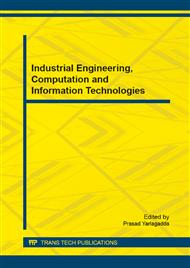p.1348
p.1352
p.1359
p.1365
p.1369
p.1376
p.1380
p.1384
p.1389
Research of the Status of Electrical Energy in Energy Consumption in China
Abstract:
Nowadays, energy consumption has been to be one of the biggest problems in China. It is very important to increase proportion of electric power among the end-use energy market for optimization of end-use energy consumption structure. Research on the status of electrical energy in energy consumption for China is a critical method to improve its development. In this paper, it analyses the electrical energy status in the industry energy consumption from 1995 to 2010. Secondly, status of electrical energy in the final energy consumption has been researched deeply. Finally, it analyses the role of electrical energy in energy consumption according to the curve of data from 1995 to 2010, gives some suggestions for optimization of the energy consumption structure so that save energy.
Info:
Periodical:
Pages:
1369-1375
Citation:
Online since:
December 2014
Authors:
Keywords:
Price:
Сopyright:
© 2015 Trans Tech Publications Ltd. All Rights Reserved
Share:
Citation:


